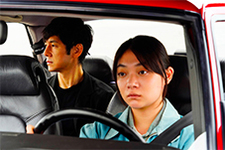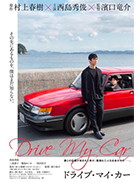Drive My Car (Doraibu mai kā)
|  Ryûsuke Hamaguchi’s overly praised Drive My Car (Doraibu mai kā) is a long, three-hour dramatic slog that shouldn’t have been a minute over two hours. The extraordinary running time for a drama of such generally shallow ambitions is perhaps the most obvious of the film’s issues, and had Hamaguchi dispensed with what amounts to a 40-minute prologue and taken out all the overly long shots from inside a moving vehicle, he could have easily lost an hour. This is not to say that there are not some aspects of the film that are admirable, but what works is ultimately buried in the tedium that quickly becomes the film’s defining characteristic. The film’s protagonist is Yûsuke Kafuku (Hidetoshi Nishijima), a middle-age theatre director and actor whose wife, Oto (Reika Kirishima), is a television screenwriter. As anyone who has read a general plot summary knows, Oto dies, leaving Yûsuke grief-stricken—or so we are meant to believe. Even though Hamaguchi spends a significant portion of the film’s first hour on Yûsuke and Oto’s relationship, little emerges about it other than the fact that it is staid and punctured by Oto’s infidelity, which Yûsuke witnesses firsthand at one point when he returns unexpectedly to find her with another man, who is most likely Kôshi Takatsuki (Masaki Okada), the pop-handsome young actor starring in her latest project (they are so into their sexual activity that they never notice Yûsuke standing there in abject dejection). Sex plays a big role here, as Oto apparently gets all her best ideas when sexually engaged, which leads to all manner of labored art-film pretensions mixing sex and creativity (it fails both literally and as metaphor). With all that screen time spent, there is little sense of loss when Yûsuke finds Oto dead on the floor one night, which happens to be the same night that she had asked to talk to him about something important. We then jump ahead several years, where Yûsuke has taken a position directing an experimental adaptation of Anton Chekhov’s Uncle Vanya for an arts festival in Hiroshima. The play is to be performed by actors who speak different languages, including Japanese, Chinese, Korean, and sign language, and while Yûsuke would normally have played the central role of Vanya, he steps back this time due to his unwillingness to make himself vulnerable on the stage, giving the role instead to Takatsuki, the handsome young actor he thinks he witnessed having sex with his wife. His reasoning for casting Takatsuki—who is clearly far too young for the role and not well suited to it—is left vague, as is just about everything until it comes time for the characters to express themselves in long speeches about their pain and loss and guilt. In the meantime, we get lots of scenes of Yûsuke being driving to and from Hiroshima in his prized 1987 Saab 900 Turbo by Misaki Watari (Tôko Miura), a young woman who is hired to be his driver while he is directing the play (this is an arrangement forced on him by the festival organizers for legal liability reasons). Misaki is quiet and intense, and you just know that she is harboring some great pain and loss in her past—which, of course, she is. She and Yûsuke are meant to be each other’s emotional salvation (Misaki is the age that Yûsuke’s daughter, who died of pneumonia at age 4, would have been), but like the rest of the film, their relationship is so somber and held at arm’s length that we don’t ever feel the connection. Hamaguchi shows it to us relentlessly, sometimes in touching images such as their holding their cigarettes out the moon roof together, but too much of it feels forced and contrived. The film, which was adapted by Hamaguchi and Takamasa Oe from a short story by celebrated Japanese novelist Haruki Murakami, is filled with contrivances, including a strange violent streak that afflicts the otherwise seemingly awkward Takatsuki whenever someone takes his picture. There is also a late development in which one of the main actors in the play has to leave, which causes a crisis that a production of that sort likely wouldn’t have because it would have understudies in place for just such an occasion. There are some well-played scenes, including a dinner scene after Yûsuke learns that the mute actress he cast to play Sonya is actually the wife of the translator with whom he has been working. It is a poignant moment in which lies are revealed to have noble cause, and the dinner has a familial warmth and sense of human connection that the rest of the film, with its you-can’t-really-know-anyone ethos, is otherwise studiously lacking. Hamaguchi leans heavily on the play-within-the-film, perhaps hoping that the universal themes embodied in Chekhov’s dramatization of familial dysfunction will rub off on his own film and give it a sense of lasting import, but all it really does it underscore how thin Drive My Car’s premise is (the theatrical beauty of the spare stage on which the play unfolds also belies how visually drab so much of the film is). Pain and loss and grief and guilt are big emotions that the film manages to render small, which turns what should have been an emotionally engaging drama into a study in monotony. Copyright © 2022 James Kendrick Thoughts? E-mail James Kendrick All images copyright © Janus Films |
Overall Rating: 
 (2)
(2)


